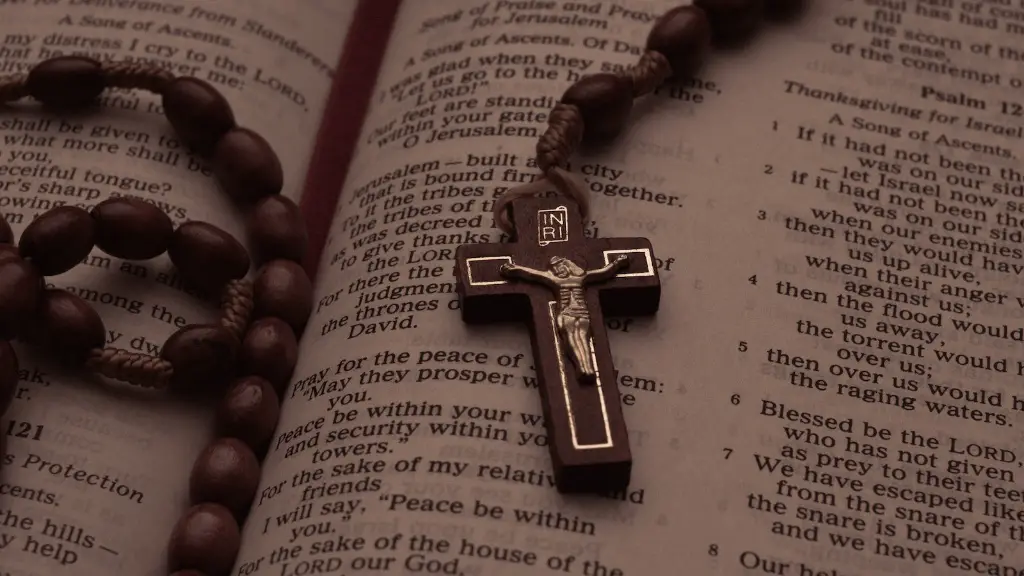Introduction
The Bible has been used for centuries by many to understand the moral and ethical values of society. The Bible is widely accepted as the source of religious teaching and inspiration. But with the increasingly widespread acceptance of LGBT+ rights, many are wondering what the Bible says about homosexuality. Does the Bible talk about homosexuality, and if so, what does it say? This article will explore the Bible’s interpretation of homosexuality and its stance on LGBT+ rights.
Biblical Passages On Homosexuality
The Bible contains numerous passages that discuss homosexuality. In the Old Testament, homosexual acts are labelled an “abomination” and punishable by death. Leviticus 20:13 states, “If a man lies with a male as with a woman, both of them have committed an abomination; they shall surely be put to death; their blood is upon them.” In the New Testament, passages such as 1 Corinthians 6:9 and 1 Timothy 1:10 describe homosexual acts as sinful. It is important to note, however, that these passages also forbid other sins such as greed and lust.
Interpretation Of Biblical Passages
The interpretation of biblical passages on homosexuality is a matter of deep debate. Some interpret the passages to mean that homosexuality is an abomination and should be punished, while others take the passages to mean that homosexual acts may be sinful but not an abomination or worthy of punishment. Some believers, including clergy in some denominations, have gone so far as to suggest that homosexuality is natural and part of God’s will and should be accepted.
Connection To LGBT+ Rights
The discussion of biblical passages on homosexuality has caused many to question the connection between the Bible and LGBT+ rights. While some churches accept LGBT+ people and issues, others reject them and even condemn homosexuality as immoral. LGBT+ issues have become increasingly politicized in recent years, and many politicians have tried to use the Bible to further their own agendas on issues such as same-sex marriage and LGBT+ rights.
Views On ‘Love Is Love’
The idea of “love is love” has become a popular phrase among those supporting LGBT+ rights. The phrase essentially means that any love between two people is valid and should be respected, regardless of gender. While the Bible does not explicitly address love between two people of the same gender, some Christians have interpreted Bible passages to mean that God accepts and supports all types of love, regardless of gender. As such, many believers view the “love is love” idea as compatible with Christianity.
LGBT+ Movement & Christianity
The ongoing convergence of LGBT+ rights and Christianity has caused debate and discussion among members of both communities. LGBTQ+ Christians have faced discrimination and marginalization from members of their own faith, causing many to abandon their faith or be forced to reconcile their religious beliefs with their sexuality. On the other hand, some members of the LGBT+ movement believe that Christianity is fundamentally opposed to LGBT+ rights and that its teachings are outdated.
Christian Denominations On LGBT+ Rights
Due to the wide range of opinions on homosexuality within Christianity, various denominations have taken different stances on LGBT+ rights. For instance, the Catholic Church officially opposes same-sex marriage and does not allow its members to be openly LGBT+. In contrast, the Episcopal Church and the United Church of Christ have been more welcoming of LGBT+ people and issues. Other denominations, such as the Lutheran Church and Presbyterian Church, sit somewhere in between, allowing LGBT+ members to participate in services and ceremonies but not taking a stance on same-sex marriage or other LGBT+ issues.
Impact On LGBT+ Believers
The debate around LGBT+ rights and Christianity has had a significant impact on the lives of LGBT+ believers. Many feel a strong sense of conflict between their faith and their sexuality, leading to feelings of guilt and isolation. However, there are also those who believe that it is possible to reconcile their faith and their sexuality, finding comfort and acceptance within their religious communities.
LGBT+ People & The Bible
The Bible does not explicitly mention homosexuality, and its passages on the topic are open to interpretation. Despite this, the debate around the topic continues to rage within both the Christian faith and the wider LGBT+ community. Ultimately, believers must decide for themselves how to interpret the Bible in light of today’s understanding of LGBT+ issues.
Church Culture & Exclusion
The LGBT+ movement has been met with resistance in some Christian denominations, and many non-LGBT+ believers view homosexuality as incompatible with Christianity. This resistance and exclusion has led to a polarized church culture, with activists and progressive believers on one side and conservative believers on the other. Both sides of the debate must recognize the validity and necessity of each other’s perspectives in order to bridge the divide.
LGBT+ Community Support
Those motivated by faith to support LGBT+ rights have formed numerous organizations dedicated to promoting LGBT+ acceptance within the Church. These organizations, such as Trinity and Tobit, provide support and resources to LGBT+ believers and their allies and strive to create safe and inclusive spaces for them within the church.
LGBT+ Political Support
In recent years, many politicians from both the left and right have supported LGBT+ rights. This support has come in the form of legislation that seeks to promote equal rights for LGBT+ people and protect them from discrimination and hate crimes. Such legislation has been met with both praise and criticism from both believers and non-believers alike.
Progressively Progressive Churches
As the debate around LGBT+ rights continues, some churches are taking a more progressive approach. Instead of condemning homosexuality, they are choosing to accept and celebrate diversity, welcoming LGBT+ members and allies into their congregations. These churches serve to create a safe space for LGBTQ+ believers, allowing them to feel secure in their identity and supported by their spiritual communities.
Conclusion
The debate around LGBT+ rights and the Bible is complex and divisive. While the Bible does not explicitly mention homosexuality, its passages on the topic are open to interpretation. As the discussion continues, it is important to recognize the validity and importance of each perspective. At the same time, supporters of LGBT+ rights must strive to create a space within the church that is inclusive and supportive of LGBTQ+ believers.



